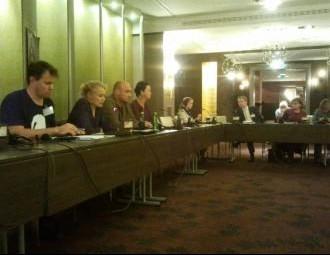Human rights in Belarus were "dimensioned” in Warsaw

Simultaneously with the annual meeting of OSCE Human Dimension Meeting on October 3 in Warsaw a side event called “Observance of human rights in Belarus: current situation” took place.
The discussion was organized by the International Federation for Human Rights (FIDH) and three Belarusan organizations - Human Rights Centre “Viasna”, Assembly of Pro-Democratic NGOs and Legal Transformation Centre “Lawtrend”.
Within the framework of the side event human rights fighters covered the topics of the greatest concern in the situation with the human rights in Belarus, learned EuroBelarus Information Service in the Legal Transformation Centre “Lawtrend”.
Aleksandra Kulaeva, the head of the FIDH department for Eastern Europe and Central Asia, together with the organization-member of the federation in Belarus – Human Rights Centre “Viasna” - presented a report on the situation with political prisoners in Belarus. Particular attention was paid to the current situation with the vice-president of the International Federation for Human Rights, Ales Bialiatski, who has been imprisoned since August 2011. Conditions of political prisoners’ detention were also assessed.
Valiantsin Stefanovich, vice-chairman of the Human Rights Center “Viasna”, proceeded with the topic of the political prisoners and reported on the situation with the freedom of peaceful assembly, as well as on the situation with the penitentiary system in Belarus, basing his report on the 2013 detention facilities monitoring.
Yury Chavusau, the lawyer of the Assembly of Pro-Democratic NGOs of Belarus, talked about the development of the Belarusian legislation regulating NGO activities and about legal practice in this field in 2013. He paid particular attention to the changes that have been introduced to the law “On public associations” and the law “On political parties”. The speaker dwelt on the practical application of legal restrictions regarding NGOs receiving foreign and domestic donations that was imposed in autumn 2011. Yury Chavusau also talked about current situation with the registration of new NGOs and the application of Article 193.1 of the Criminal Code of Belarus which punishes unregistered NGOs for any activities.
Agency for Social and Political Expert Appraisal located in Minsk, Solidarity with Belarus Information Office based in Warsaw and German Marshall Fund of the United States presented Belarusian Yearbook 2012 “The Deep Freeze”.
Within this panel prominent Belarusian experts presented the main political and economic trends in Belarus identified in the Belarusian Yearbook 2012. Key trends included: “narrowing” of the State – decision taken by an ever diminishing circle; lack of technical, financial and human resources; growing economic and foreign policy dependence on Russia; rise in pro-European moods and fewer efforts to integrate with Russia; reduced social obligations of the State, stagnation of electoral ratings and trust levels toward authorities; crisis of State policy and inability to propose a vision for the future. The Belarusian Yearbook 2012 is the fourth edition of an annual multi-disciplinary analysis of trends in the Belarusian State and society. The Yearbook was published by the Agency for Social and Political Expert Appraisal, and supported by the German Marshall Fund of the United States.
The representatives from NGOs, the Committee on International Control over the Human Rights Situation in Belarus, a number of state delegations of countries-members of the OSCE were present at the side event. Within the framework of the event short discussion on the issue of non-implementation the recommendations of the UN Human Rights Council by Belarus was organized for the speakers and the audience.
-
03.01
-
07.10
-
22.09
-
17.08
-
12.08
-
30.09



























